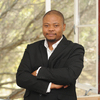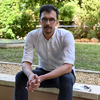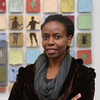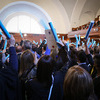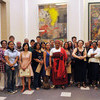The African archive and open access
17 December 2024 | Story Kamva Somdyala. Photos Lerato Maduna. Read time 4 min.
“The African archive is not neutral; it reflects the priorities and power structures of those who curate it; each of us carries the archives within us.”
These were the reflective remarks made by the dean of the Centre for Higher Education Development (CHED), Associate Professor Kasturi Behari-Leak, as she gave the keynote address during a session of the Global Summit on Diamond Open Access (DOA), hosted by the University of Cape Town (UCT) Libraries.
The summit brings together a community of researchers, publishers, universities, research funding and implementation organisations, academic libraries, learned societies and policy makers committed worldwide to strengthening the DOA ecosystem. The theme Associate Professor Behari-Leak was speaking on was “Social justice advancing inclusivity, decolonialisation and demarginalisation: exploring the concept of social justice in a movement that seeks to be more inclusive and results in decolonialisation and demarginalisation”.

To elucidate her point, she drew on the opening session of the summit. “[It] reflected the warmth, hospitality, creativity and collaborative spirit that is Africa. You saw the African archive in action; some parts might have affirmed your ideas and associations about Africa – the dance, music, rhythm and talent – and some parts may have disrupted your sensibility about Africa and the paradigm it’s been placed in.”
Curating African narratives
“For many of us in South Africa, 30 years into democracy, we are still grappling with core questions: What does it mean to place Africa at the centre of our epistemic worlds? What does it mean to be African?”
Behari-Leak then drew the audience to the attention of former South African president Thabo Mbeki’s seminal speech, “I am an African”, inviting attendees to think deeply about that speech.
“There is no doubt that meanings are influenced hugely by representation, in the form of stereotypes or new conceptions. When western agencies curate African narratives, they often reproduce colonial stereotypes or reductive tropes of Africanness that serve external agendas, rather than reflecting the lived realities of the continent.”

She continued: “This can lead to Africa being framed as peripheral to modernity or a land of deficit and scarcity or an unspoilt exotic other, busy with safari tourism and cultural mysticism. These strip Africa of its nuance. If Africa’s narratives are framed with reductionist western epistemologies, then African scholars, artists and storytellers must reclaim control and reframe how Africa is understood, both locally and globally through their research.
“The importance of reflecting how universities as sites of knowledge production can foster equity in scholarly communication cannot be over emphasised. Making scholarly content accessible strengthens the global collective to address grand challenges such as environmental crises and public health emergencies.
“Let’s challenge the accessibility of research and emphasise the importance of the substantive content and purpose of that research. Accessibility alone may not be sufficient without ensuring the relevant, value and purpose of research which should address systemic inequities particularly for underrepresented groups.”

It would not be a talk on decolonisation without harkening to the Rhodes Must Fall and Fees Must Fall movements, which reverberated through higher education in 2015.
On this point, Behari-Leak said: “On our campus, it was indeed a traumatic experience. In 2015, we hadn’t realised just how colonial universities were until students disrupted our notions of what epistemes do and how they alienate and how they marginalise.”
The summit included panel conversations, which included UCT Vice-Chancellor Professor Mosa Moshabela.
 This work is licensed under a Creative Commons Attribution-NoDerivatives 4.0 International License.
This work is licensed under a Creative Commons Attribution-NoDerivatives 4.0 International License.
Please view the republishing articles page for more information.
Centre for Higher Education Development
In the news


.jpg)



